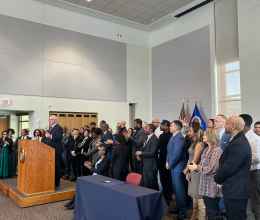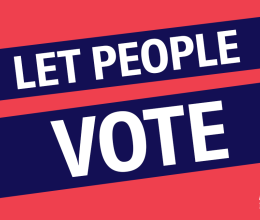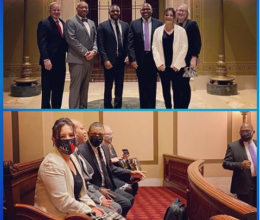
SAINT PAUL, Minn. -- The American Civil Liberties Union of Minnesota argued today in the state Supreme Court that a special interest group’s attempt to invalidate a state law restoring voting rights to 55,000 Minnesotans should be swiftly and soundly rejected.
In 2023, a new state law restored the vote to people on felony probation, supervision and work release, following a Minnesota Supreme Court decision empowering the Legislature to take this action. The Minnesota Voters Alliance (a group that has consistently fought against restoring the vote) sued, alleging that the new law is unconstitutional in a last-ditch effort to stop these Minnesotans from voting in future elections.
The ACLU-MN and pro bono attorneys from Faegre Drinker Biddle & Reath LLP are fighting to uphold the law and preserve these voting rights. We intervened in the lawsuit on behalf of clients Jennifer Schroeder and Elizer Darris, who fought for years to regain the vote and were among the first in the state to register when voting became legal for them last year.
“The state Supreme Court clearly said that the Legislature had the power to act to restore the vote to these 55,000 Minnesotans, which is exactly what lawmakers did,” said ACLU-MN Staff Attorney David McKinney. “This special-interest group is using a meritless lawsuit to try to disenfranchise these voters and exclude them from democratic participation in our society. We want to make it perfectly clear that Minnesotans with felony convictions who are living in our community can legally vote, and we’ll keep fighting to make sure they keep this fundamental right.”
“The Restore the Vote law furthers the governmental interest in electoral participation, improves racial disparities in voting access, and will further public safety by reducing recidivism,” said Craig Coleman, who heads the pro bono team from Faegre Drinker. “The law restored the vote to thousands of Minnesotans who are living in the community, raising families, working and paying taxes, and they deserve to have their voices and votes count.”
ACLU Voting Rights Project Director Sophia Lin Lakin said: “Restoring the vote ended a discriminatory law that led to racial disparities at the voting booth and helped people rejoin their communities. Efforts to register people whose voting rights were restored are well underway, and stealing away this right would lead to heightened mistrust in our legal system that would ripple across the generations.”
Civil rights activist and ACLU-MN client Elizer Darris, who challenged the voting restriction in court, said: “Last year, I voted for the first time in my life based on legislation that we fought to get passed. After years of registering other people to vote, it felt good to finally take part in the electoral process that I and so many others were locked out of. It is dismaying to see this continued assault on our access to the ballot. I look forward to the court protecting our newfound right to have our voices represented by our government.”
TIMELINE
In 2019, the ACLU, ACLU-MN and Faegre Drinker filed the Schroeder lawsuit to restore the vote on behalf of Schroeder, Darris and others.
In February 2023, the Minnesota Supreme Court ruled in Schroeder, explicitly stating that government has broad discretion to determine how civil rights and the right to vote are restored following a felony conviction.
Shortly after, the Legislature passed the legislation; in March 2023, Governor Walz signed it into law.
June 1, 2023: People living in the community on felony probation or supervision could now register and vote.
June 29, 2023: The MVA sued to rescind this right.
August 31, 2023: The ACLU, ACLU-MN and Faegre Drinker filed a request to intervene in the lawsuit on behalf of Schoeder and Darris to protect voter restoration.
The ACLU-MN is part of the Restore the Vote Coalition and fought for 20 years to restore the vote. The ACLU-MN is a nonprofit, nonpartisan organization that works to protect and expand the civil rights and liberties of all Minnesotans through litigation, lobbying and community engagement.
#30#

